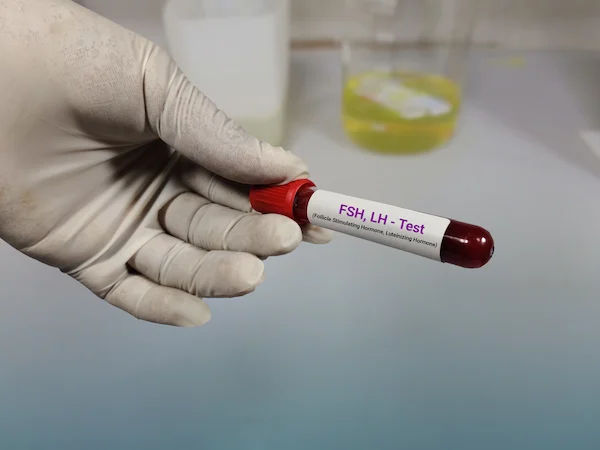5 Symptoms in Women That Could Mean You Need a Testosterone Test
Experiencing excess hair growth, acne, or irregular periods? These may be signs of high testosterone in women. Learn when to get tested, what it means, and how it affects your health.

Written by Dr. Rohinipriyanka Pondugula
Reviewed by Dr. Shaik Abdul Kalam MD (Physician)
Last updated on 9th Sep, 2025
.webp?tr=q-80,f-webp,w-350,dpr-2,c-at_max 700w)
Although testosterone is often viewed as a hormone linked to men, it plays an important role in women's health too. It helps regulate mood, energy, libido, bone strength, and overall hormonal balance. When testosterone levels become too high in women, they can lead to noticeable symptoms that may affect daily life and long-term well-being. This is especially relevant for women with Polycystic Ovary Syndrome (PCOS), where elevated testosterone is a common feature. Signs like persistent acne, unusual hair growth, or irregular menstrual cycles can point to an underlying hormonal issue. Ignoring these symptoms may delay diagnosis and prevent early treatment. A simple blood test can check your testosterone levels, offering valuable insight into the cause of your symptoms.
This guide offers a clear overview of testosterone's role in women's health, highlights common symptoms of hormonal imbalance, and explains what every woman should know about when and why to get tested.
What Does Testosterone Do in Women?
Although commonly associated with men, testosterone is a crucial hormone in women as well, produced in smaller amounts by the ovaries and adrenal glands. While women have significantly lower levels than men, testosterone plays a key role in several aspects of physical, mental, and reproductive health.
- Supports libido and sexual function: Testosterone contributes to sexual desire and arousal. Low levels can lead to reduced libido or difficulty with sexual satisfaction.
- Maintains muscle mass and strength: It helps preserve lean body mass and promotes muscle tone, especially as women age.
- Supports bone density: Alongside estrogen, testosterone helps maintain strong bones and may help protect against osteoporosis after menopause.
- Influences mood and cognitive health: Balanced testosterone is linked to improved mood, energy, and mental clarity. Imbalances may contribute to fatigue, irritability, or difficulty concentrating.
- Contributes to ovarian function: Testosterone plays a role in follicular development and may influence how well the ovaries respond during the menstrual cycle and fertility treatments.
However, when a woman's body produces too much testosterone, it can disrupt the delicate hormonal balance, leading to a variety of symptoms that can significantly impact quality of life.
5 Symptoms in Women That Could Mean You Need a Testosterone Test
If you're experiencing any of these persistent or worsening symptoms, especially if they appear together, it's a strong indicator that you should discuss a testosterone test with your doctor:
- Excess Hair Growth (Hirsutism): This is one of the most common and noticeable signs of high testosterone in women. It refers to the growth of coarse, dark hair in a male-pattern distribution, such as on the upper lip, chin, chest, back, abdomen, or inner thighs.
- Persistent or Severe Acne: While acne is common, severe or persistent breakouts, especially around the jawline, chin, and back, that don't respond to typical treatments, can be a sign of elevated androgen levels.
- Irregular or Absent Periods (Oligomenorrhea or Amenorrhea): High testosterone can disrupt the normal ovulation process, leading to infrequent, irregular, or completely absent menstrual cycles. This is a key diagnostic criterion for PCOS.
- Hair Thinning or Loss (Androgenic Alopecia): Paradoxically, while high testosterone can cause excess body hair, it can also lead to male-pattern hair loss on the scalp, characterised by thinning at the temples or crown.
- Weight Gain and Difficulty Losing Weight: Many women with high testosterone, particularly those with PCOS, struggle with unexplained weight gain, often around the abdomen, and find it very difficult to lose weight despite diet and exercise efforts.
Other less common but more severe symptoms of very high testosterone might include deepening of the voice, decrease in breast size, and clitoral enlargement.
Get Your Health Assessed
Why These Symptoms Signal a Need for Testing
These symptoms are often linked to elevated testosterone because androgens play a role in hair growth, oil production in the skin, and ovarian function.
- Polycystic Ovary Syndrome (PCOS): This is the most common cause of high testosterone levels in women, affecting up to 1 in 10 women of reproductive age. High androgen levels are a key diagnostic feature of PCOS, leading to many of the symptoms listed above (hirsutism, acne, irregular periods, and often weight gain).
- Other Causes: While PCOS is prevalent, high testosterone can also be caused by other conditions, such as adrenal gland disorders, certain ovarian tumours, or specific medications. This is why testing is crucial for accurate diagnosis.
What the Testosterone Test Measures
A testosterone test for women typically measures:
- Total Testosterone: This measures the total amount of testosterone in your blood, both bound to proteins and unbound (free).
- Free Testosterone: This measures the amount of testosterone that is not bound to proteins and is therefore "active" and available for your body's tissues to use. Free testosterone is often a more accurate indicator of androgen excess symptoms.
- Sex Hormone-Binding Globulin (SHBG): This protein binds to testosterone, regulating how much free testosterone is available. SHBG levels help interpret total and free testosterone results.
How Doctors Interpret the Results
Your doctor will look at the levels of Total Testosterone, Free Testosterone, and SHBG, and interpret them in the context of your symptoms and other health markers.
- Elevated Total and/or Free Testosterone: Levels above the normal range for women indicate androgen excess.
- Low SHBG: Can also lead to higher free testosterone, even if total testosterone is borderline.
- Correlation with Symptoms: Your doctor will connect these lab findings with your clinical symptoms (hirsutism, acne, menstrual irregularities) to confirm a diagnosis like PCOS or investigate other causes.
How Often Should Women Get a Testosterone Test?
The frequency of testosterone testing depends on your symptoms, diagnosis, and whether you're undergoing any form of treatment. Here’s when testing may be appropriate:
- First-time symptoms: If you're noticing unusual facial or body hair, irregular periods, persistent acne, or hair thinning, a one-time testosterone test can help identify a hormonal imbalance.
- Ongoing monitoring for PCOS or hormonal disorders: If you’ve been diagnosed with conditions like Polycystic Ovary Syndrome (PCOS) or adrenal dysfunction, your doctor may recommend repeat testing every 3 to 6 months to monitor your response to treatment or lifestyle interventions.
- Fertility assessments: If you're undergoing fertility evaluation or treatment, testosterone may be tested once as part of a comprehensive hormone panel, with follow-ups based on your specific fertility plan.
- Hormone therapy management: If you're on treatments that affect hormones, such as menopause management or gender-affirming care, testing is typically done before starting therapy and then periodically to ensure safe and effective dosing.
- No current symptoms or diagnoses: If you’re not experiencing symptoms and have no known hormonal conditions, routine testosterone testing is generally not necessary unless your healthcare provider advises it based on personal or family history.
Book Your Testosterone Test via Apollo 24|7
If your doctor recommends a testosterone test to investigate your symptoms or as part of a hormonal assessment, choosing a reliable testing service is important. Apollo 24|7 makes this simple by providing accurate lab tests with quick results. This helps you and your doctor understand your hormonal balance clearly and create a personalised plan to manage your well-being effectively.
Why Choose Apollo 24|7 for Your Health Checkups?
- Comprehensive Test Panels: You can choose to book a standalone Testosterone test or opt for a comprehensive package like the Apollo PCOD Profile Advanced, which includes additional hormone checks related to ovarian function, metabolic health, and androgen balance, providing a complete picture of hormonal health in women with PCOS concerns.
- NABL-Accredited Labs: Tests are done in labs certified by the National Accreditation Board for Testing and Calibration Laboratories (NABL), ensuring accurate and trustworthy results.
- Home Sample Collection: Enjoy the convenience of blood sample collection at your home, saving you time and providing privacy.
- Easy Online Booking: Schedule your test quickly and easily through the Apollo 24|7 app or website.
- Fast Digital Reports: Receive secure, detailed test reports online promptly, ready to share with your doctor.
- Trusted Brand: Benefit from the trusted expertise and healthcare legacy of Apollo Hospitals Group, one of India’s most respected medical networks.
By choosing Apollo 24|7, you get access to dependable, convenient diagnostic services that make it easier to understand and manage your health effectively.
For the most accurate and current pricing for Apollo PCOD Profile Advanced, it is best to check the Apollo 24|7 website, use their mobile app, or contact their customer support team directly. Pricing may vary based on your location, available offers, or membership benefits.
Schedule an Apollo PCOD Profile Advanced Test
Conclusion
For women, particularly those with or suspecting PCOS, recognising the symptoms of elevated testosterone is a crucial step towards better health. Persistent excess hair growth, severe acne, irregular periods, hair thinning, and unexplained weight gain are strong indicators that a testosterone test is needed.
Understanding what the test measures and what the results signify empowers you and your doctor to accurately diagnose underlying hormonal imbalances. This leads to tailored treatment plans that can effectively manage symptoms, improve fertility, and enhance overall well-being. If you're experiencing these symptoms, consult your doctor to discuss whether a testosterone test can provide the answers you need.



.webp)